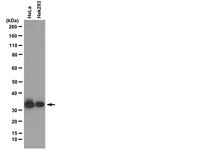04-1481-25UG Sigma-AldrichAnti-RPA2 p34 Antibody, clone RPA20, 1-46 (mouse monoclonal)
Anti-RPA2 p34 Antibody, clone RPA20 1-46 is a Mouse Monoclonal Antibody for detection of RPA2 p34 also known as Replication factor A protein 2 & has been validated in WB.
More>> Anti-RPA2 p34 Antibody, clone RPA20 1-46 is a Mouse Monoclonal Antibody for detection of RPA2 p34 also known as Replication factor A protein 2 & has been validated in WB. Less<<Recommended Products
Overview
| Replacement Information |
|---|
Key Spec Table
| Species Reactivity | Key Applications | Host | Format | Antibody Type |
|---|---|---|---|---|
| H, M | WB | M | Purified | Monoclonal Antibody |
| References |
|---|
| Product Information | |
|---|---|
| Format | Purified |
| Control |
|
| Presentation | Purified mouse monoclonal IgG1 in buffer containing 0.1 M Tris-Glycine (pH 7.4, 150 mM NaCl) with 0.05% sodium azide. |
| Quality Level | MQ100 |
| Physicochemical Information |
|---|
| Dimensions |
|---|
| Materials Information |
|---|
| Toxicological Information |
|---|
| Safety Information according to GHS |
|---|
| Safety Information |
|---|
| Storage and Shipping Information | |
|---|---|
| Storage Conditions | Stable for 1 year at 2-8°C from date of receipt. |
| Packaging Information | |
|---|---|
| Material Size | 25 μg |
| Transport Information |
|---|
| Supplemental Information |
|---|
| Specifications |
|---|
| Global Trade Item Number | |
|---|---|
| Catalogue Number | GTIN |
| 04-1481-25UG | 04054839350108 |
Documentation
Anti-RPA2 p34 Antibody, clone RPA20, 1-46 (mouse monoclonal) Certificates of Analysis
| Title | Lot Number |
|---|---|
| Anti-RPA2 p34, clone RPA20, 1-46 (mouse monoclonal) - 3614816 | 3614816 |














